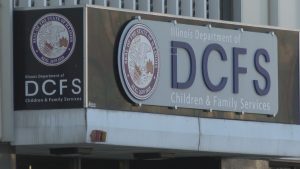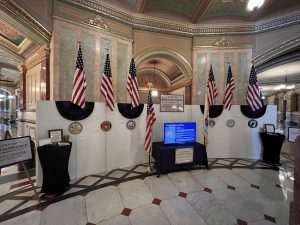SPRINGFIELD – A Cook County judge has declared that the Governor and legislative Democrats went too far when they changed how awards are calculated in personal injury and wrongful death lawsuits. The judge ruled their new law unconstitutional, setting up a potential ruling by the Illinois Supreme Court.
Several new bills were signed into law recently, including a measure sponsored by State Sen. Dave Syverson (R-Cherry Valley) that improves visitation rights for patients in healthcare facilities during disaster declarations such as COVID-19.
Other new laws allow the use of pepper spray for self-defense by Department of Children and Family Services (DCFS) investigators; provide new protections for victims of child sex crimes; and increase access to benefits and services for emergency dispatchers.
And Illinoisans are once again able to visit the Capitol and pay their respects to the brave men and women who have given their lives in service of their country.
Prejudgment interest law ruled unconstitutional
 Gov. JB Pritzker and his legislative allies received a strong rebuke in a Cook County courtroom recently, as a judge there ruled a recent new law as unconstitutional. The law in question changed the way that interest is calculated for rewards in personal injury and wrongful death lawsuits, by starting the calculation of interest at the day a lawsuit was filed.
Gov. JB Pritzker and his legislative allies received a strong rebuke in a Cook County courtroom recently, as a judge there ruled a recent new law as unconstitutional. The law in question changed the way that interest is calculated for rewards in personal injury and wrongful death lawsuits, by starting the calculation of interest at the day a lawsuit was filed.
The change was the result of legislation rammed through during the last day of the 2021 legislative session by Democratic leaders and quickly signed into law by the Governor.
A wide spectrum of industry groups—including businesses, manufacturers, and even the Illinois State Medical Society—had warned of the potential consequences of the legislation, which could make it more difficult for businesses and increase costs for consumers throughout the state.
In her ruling, the judge stated that the law created different classes of plaintiffs and defendants, by creating larger payouts in personal injury and wrongful death lawsuits compared to other types of cases. She made the ruling as part of a medical malpractice case that it would have affected. The judge also ruled the new law violated businesses’ constitutional right to a trial by jury by taking the award of damages out of the hands of their peers. The ruling is currently limited to that particular case, but if the defendants appeal, it could be revisited by the Appellate Court and then taken up by the Illinois Supreme Court.
New law addresses healthcare facility visitation rights

A new law sponsored by Syverson will help ease the kind of terrible isolation senior citizens and other healthcare facility residents had to endure during the past two years of government-mandated closures.
Senate Bill 1405 updates visitation requirements in the Medical Patient Rights Act in the event of a government-issued disaster proclamation responding to an outbreak or epidemic of communicable disease, and the subsequent rules administered by the Illinois Department of Public Health (IDPH).
“What happened to the residents of healthcare and long-term-care facilities, and their families, the last two years must not be allowed to happen again,” Syverson said. “This new law changes the outcomes of across-the-board closures that prevented residents from having access to their loved ones. This new law would ban actions by the Governor that leave many people’s loved ones alone in hospitals or long-term-care facilities, like they did last year.”
Senate Bill 1405 requires healthcare facilities to ensure that a patient or resident has the opportunity for at least one visitor, not including clergy, who shall be permitted to visit with a patient in addition to the permitted number of visitors. Visitation would be subject to guidelines, conditions, and limitations of the facility’s visitation policy, as well as all federal guidelines.
“It was very difficult for many healthcare and long-term care facilities as they were forced to follow the IDPH rules resulting from the Governor’s edict without the ability to provide consideration for special circumstances. And these facilities also bore the brunt of the complaints,” Syverson said. “The unfortunate results of the absolute pandemic mandates were that many families had loved ones who died alone, or who did not understand why their families were not coming to see them. We understand the need for caution in public health emergencies and know restrictions are necessary. We are just asking for compassion and consideration from the government in special cases.”
DCFS employees may carry pepper spray
 Frontline DCFS employees will soon have a new option to protect themselves in potentially dangerous situations they face in the field now that the Governor has signed legislation to allow the workers to be allowed to carry pepper spray.
Frontline DCFS employees will soon have a new option to protect themselves in potentially dangerous situations they face in the field now that the Governor has signed legislation to allow the workers to be allowed to carry pepper spray.
Pepper spray is already legal for adults to carry in public for personal defense, but DCFS regulations have not allowed their employees to carry it while on duty.
Senate Bill 1486 allows DCFS frontline workers to carry pepper spray for defensive purposes while investigating cases involving allegations of child abuse and neglect. The legislation also directs the Illinois State Police to develop a program on the proper use of pepper spray. DCFS employees will be required to complete the program to carry pepper spray in the field.
The legislation was inspired by the murders of two DCFS investigators. Deidre Silas was stabbed to death in January at a home in Thayer during a child welfare investigation. In February 2018, Pamela Knight died in the hospital from injuries sustained during a brutal attack that occurred while she was trying to take a child into protective custody.
New protections for young victims of sex crimes
A new law aims to help protect the privacy rights of victims of child sex crimes by allowing a judge to clear disinterested parties from the courtroom when the victim testifies.
Under previous Illinois statute, a minor victim of a sex crime is afforded the right to testify without the presence of so-called disinterested parties. However, due to a lack of clarity within the statute, there was uncertainty on whether those privacy protections extended to victims who turned 18-years-old by the time of their trial.
Senate Bill 2942 makes it clear that judges are allowed to remove the disinterested parties even if the victim is now older than the age of 18, if the crimes occurred when the victim was a minor.
To safeguard the constitutional rights of defendants, the judge must find that parties do not have a direct interest in the case and must put their basis for that finding into the record. The new privacy protections and procedures are effective immediately.
Another protection for young victims was also recently signed into law. House Bill 4593 seeks to help victims of child sex abuse and trafficking. It puts an end to the practice of predators trying to avoid punishment by claiming that they didn’t know a victim was a minor when they solicited that minor for sex.
New law helps emergency dispatchers
 Emergency dispatchers will now have access to many of the same services and benefits as other first responders under a new state law.
Emergency dispatchers will now have access to many of the same services and benefits as other first responders under a new state law.
Senate Bill 3127 amends existing state laws to include “Emergency Medical Dispatchers” as first responders. This will allow dispatchers to be recognized as first responders, enabling them to receive many of the same services and benefits.
The new law recognizes not only the role that dispatchers play, but the fact that many of them face the same issues as other responders, including post-traumatic stress disorders and other issues.
Veterans Memorial Wall honors fallen service members
 With the State Capitol Building once again open to the public, Syverson is joining his fellow Senators to invite Illinoisans to visit the Veterans Memorial Wall display to learn more about the brave men and women featured there, and leave messages honoring those service members who gave their lives in the line of duty.
With the State Capitol Building once again open to the public, Syverson is joining his fellow Senators to invite Illinoisans to visit the Veterans Memorial Wall display to learn more about the brave men and women featured there, and leave messages honoring those service members who gave their lives in the line of duty.
Displayed in the Capitol’s Rotunda on the first floor, the Veterans Memorial Wall has become a tradition at the Capitol, with the Republican Senators first launching it in 2015. The display features a large video screen with a slide show displaying the names and photos of veterans who have made the ultimate sacrifice in defense of their country, and an area where visitors can honor these fallen heroes by writing and posting notes of thanks and/or remembrance.
The Veterans Memorial Wall will remain on display until June 15. The Illinois State Capitol is open to the public from 8:00 a.m. to 4:00 p.m. Monday through Friday, and from 9:00 a.m. to 3:00 p.m. on Saturday and Sunday.

